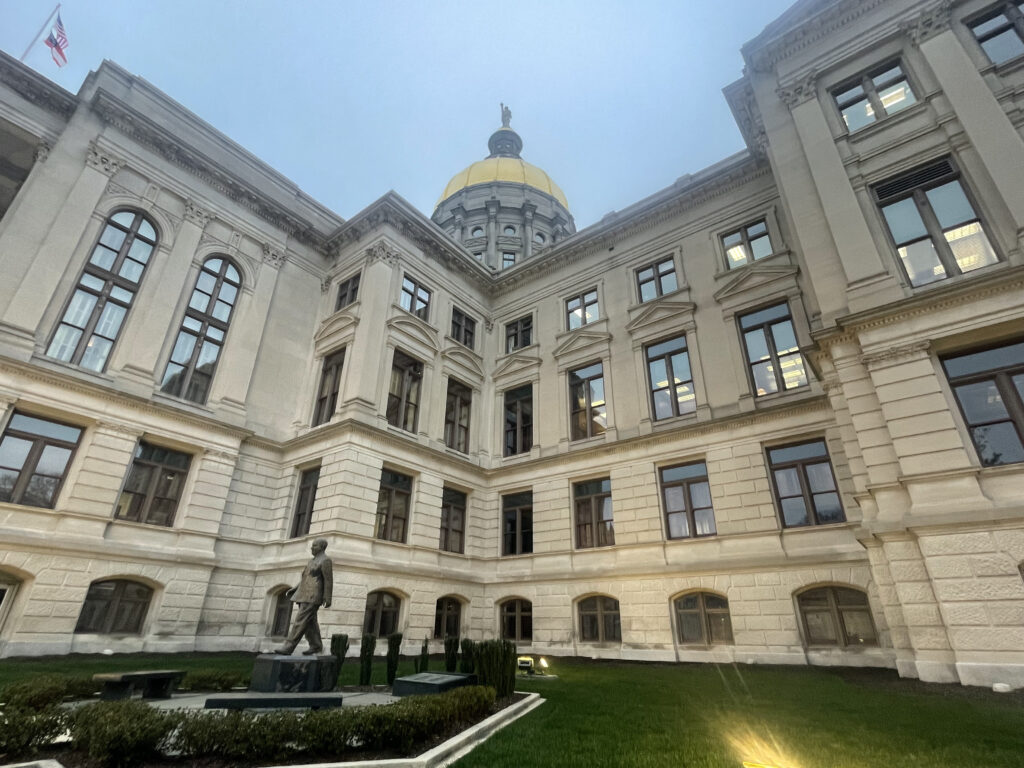A renewed debate about how victims are compensated in civil lawsuits is expected to resume in 2024 as Georgia legislators, insurance companies, attorneys, and business leaders deliberate everything from medical malpractice to whether a child safety restraint can be used as evidence and how much damages can be awarded for medical malpractice.
Georgia lawmakers concluded the 2023 legislative session last month with a few changes in the area of civil litigation known as “tort law” that generated significant debate over how to balance the rights of people wrongfully injured and business lobbyists who often push to cap the amount of damages negligent parties might have to pay in lawsuits.
Georgia has been in the crosshairs of the American Tort Reform Association that for the last several years ranked the state among the worst in the nation in its report on so-called judicial hellholes.
In this year’s legislative session, several of the bills backed by the tort association and Georgia Chamber of Commerce advanced in the state House chamber before stalling in the Senate.
The agenda that favors civil laws that aligns with the interests of businesses facing the threat of class action lawsuits ranked the Georgia Supreme Court as its nation’s worst judicial jurisdiction for 2022-2023.
During this year’s session, one of the most controversial laws to pass is Senate Bill 140, which aims to limit gender transition treatment for minors in part by making physicians and other caregivers criminally and civilly liable.
And in the final days of the session, legislators passed a measure that aligns with a recent Georgia Supreme Court ruling that outlines how courts should handle depositions for CEOs and other high ranking officials.
The Supreme Court instructed in its 2022 opinion for trial courts to consider several factors, such as the executive’s rank, their knowledge of relevant facts, and if there are other sources who are more readily available to provide the information.
“In Georgia there’s not two classes of important people and less important people in civil trial statute so the factors to consider any deposition were the same,” said Atlanta personal injury attorney Drew Ashby. “When the Supreme Court in the case against General Motors gave additional factors for the trial court to consider, what ended up happening is those factors, by and large, have been codified.”
Lawyers trying to get legislators to tamp down jury awards scored a win with a bill that passed this year designed to lower liability exposure on rideshare companies like Uber from $1 million to no more than $300,000.
“They’ve been working on this bill for a number of years saying that the costs were becoming too much for them and that they needed to reduce that,” said Ashby, who is a member of the Georgia Trial Lawyers Association’s legislative committee. “And so we worked hand in hand with them when their bill failed last session, all throughout the year, and then again, throughout the session, to get them to lower those rates.”
Meanwhile, other bills that could be revived next year include a longstanding disagreement over whether a child wearing a safety belt at the time of the car wreck is admissible evidence in a personal injury case. Senate Bill 196 fell short by five votes in the Senate.
Another Republican sponsored measure that didn’t advance this winter was the so-called Landowners Protection Act that limits a property owner’s liability for crimes committed by outsiders on their property.
The Georgia Chamber of Commerce has expressed its support for limiting caps on punitive damages, lower liability exposure for business owners, and lower insurance rates.
“Enacting legislation and policy that provides liability protection to private landowners and lessees when crimes are committed by third parties on their property is invaluable, to support community development, job growth, and upward mobility,” the chamber’s legislative report said. “This is especially true in disadvantaged communities where crime has discouraged investment due to unsafe conditions, increased business costs, and the threat of increased liability.”
The Washington, D.C. nonprofit’s membership is mostly large corporations, including tobacco companies, with a direct financial stake in restricting lawsuits. It is critical of Georgia’s “seatbelt gag rule” that prevents a jury from hearing evidence if people filing accident claims were wearing seatbelts. Georgia’s ranking is due in part to the state supreme court not adopting what the lobbying group considers should be stronger protections for high-level corporate employees.
“To make matters worse, the court issued a ruling that will force defendants to potentially pay double the plaintiffs’ attorneys’ fees when they are unsuccessful at trial,” the association’s report states. “The Georgia Supreme Court points to the Georgia General Assembly as the appropriate branch to handle growing policy concerns. The General Assembly has responded in years past, but much work remains to be done to address the lawsuit abuse sweeping across the state.”
However, Ashby noted that the tort organization’s unscientific list does not accurately represent Georgia’s civil law, which is constantly under attack by insurance industry lobbyists.
“We’ll continue to push back against bad policies that come at the expense of Georgia citizens and bills that really just benefit the insurance companies,” Ashby said.
Busy season for consumer advocates
The nonprofit Georgia Watch is one of several groups pushing for legislators to lower the interest rate cap that lenders like TitleMax argue is necessary so that people with risky credit histories can borrow money.
This year’s battle was spotlighted by competing bills that would have made a significant impact on the title loans industry.
A committee hearing was held on House Bill 342, sponsored Fayetteville Republican Rep. Josh Bonner, that would have established a lower cap on interest rates and placed more government oversight over title lenders.
Meanwhile, another lending bill that stalled this session was the industry-backed Senate Bill 254 that Georgia Watch Executive Director Liz Coyle said would have ushered in a return of predatory payday lending in Georgia.
The much debated regulations on car title pawn companies are expected to get further consideration in the Gold Dome when lawmakers return in January 2024.
“The industry is very powerful and a lot of lobbyists all descended on Georgia,” Coyle said. “House Bill 342 only got a hearing. There was not a vote even though there were overwhelming numbers of members of the House who signed on to the bill.”
Consumer advocates applauded the passage of the House Bill 221 that requires insurance companies to get approval from the state insurance commissioner before raising car insurance rates.
Coyle said that Georgia Watch will continue to stand up for everyday residents in what often is a long legislative process.
Countless hours were spent across several sessions before the passage in 2020 of a surprise medical billing act that aims to prevent Georgians from paying unexpected out-of-pocket expenses for emergency room visits or specialist visits.
One of the consumer protection bills to pass this spring is Senate Bill 84, which provides guidelines for protecting disabled or elderly adults from financial fraud.
“It took five years from the time we started working on surprise billing Consumer Protection Act before it (passed) in 2020,” Coyle said. “Very few things, unless it’s something as obvious as protecting our seniors from financial fraud, move quickly. These things take time.”









